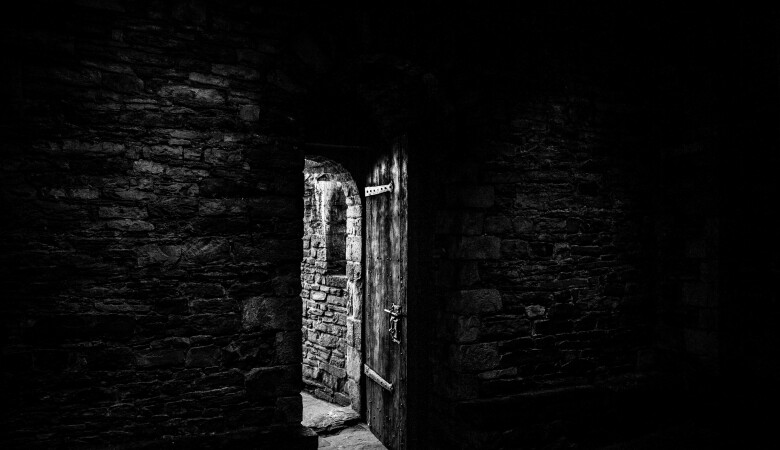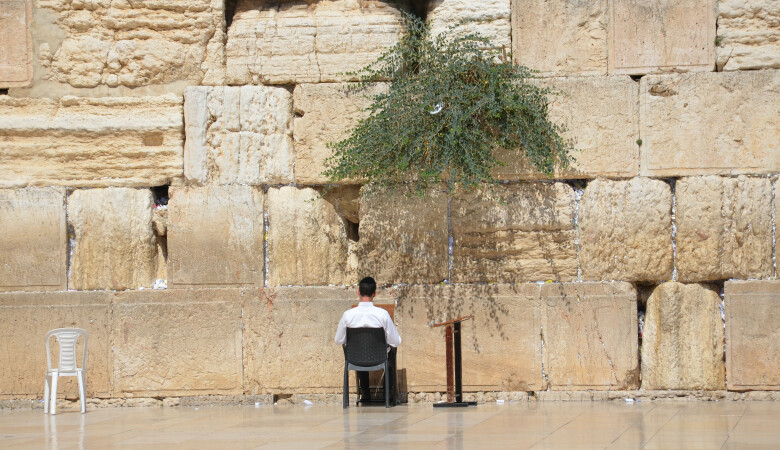Series: Mark
Jesus Predicts His Sufferings (Mark Sermon 52)
May 07, 2023 | Andy Davis
Mark 10:32-34
Resurrection of Christ, Humiliation of Christ, Prophecy
To prepare the Twelve Apostles for what was to come, Jesus instructed them in detail what was about to happen to him.
- SERMON TRANSCRIPT -
Let's turn in your Bibles to Mark chapter 10. As we continue our marvelous journey through this gospel, the Gospel of Mark, we are looking today at Mark 10:32-34. One of the most pernicious lies told about Jesus of Nazareth by unbelieving scholars is that his death came about because Jesus miscalculated the reaction to his message, got in over his head, and was arrested against his will. Surprised by it, in fact. He was swept along by political forces beyond his control and tragically killed, thus ending his dreams of a better world. In such a wicked revision of history, these scholars make Jesus out to be well-meaning, but politically naive, like a beautiful cut flower that's thrown into a raging river at flood stage. Whitewater seizing it and causing it to churn and tumble around despite its beauty, hurdling it to a massive waterfall and then over. It was pulled irrevocably to its own destruction. Nice Jesus, naive Jesus, overwhelmed Jesus, dead Jesus. Well, dear friends, nothing could be further from the truth. The central message of this marvelous Gospel of Mark comes right from the beginning. Mark 1:1, the beginning of the gospel about Jesus Christ, the Son of God. This gospel was written to give clear evidence of the deity of Christ that by reading it we might have faith in Christ for the salvation of our souls.
But the betrayal, the rest, the various trials, the condemnation, the mocking, scourging, and death of Jesus was a severe trial to the faith of his disciples. Jesus looked anything but like almighty God in his weakness, humiliation, torture and death. Jesus knew that his disciples needed special preparation for these terrible events. He wanted them to understand a central fact that He declared in John's Gospel, John 10:18, "No one takes my life from me, but I lay it down of myself. I have the authority to lay it down and the authority to take it back up again.This command I received from my father." Jesus was never a victim. He willingly laid down his life for us, for his people, to save us from God's just wrath against us for our sins. In order to establish this fact all the more, He predicted his death in detail ahead of time. In fact, He did it over and over again.
"Jesus was never a victim. He willingly laid down his life for us, for his people, to save us from God's just wrath against us for our sins"
Now the obvious question that must come to us is this, why did He do it? And beyond that, we could ask how could Jesus precisely know what would come to pass concerning himself? The fact of the matter is no one really knows the future, but God alone; the book of James makes this plain. James 4:14 says, "You do not even know what will happen tomorrow."
But Jesus is unique in human history. His entire life was lived under the shadow of the cross. Being God in the flesh, He had detailed knowledge of his immediate future as well as his eternal future. He had a unique role to play in the history of the world, to suffer and die on the cross as the savior of the world. From the moment He was born into that stable in Bethlehem, He lived under the shadow of the cross.
His mother Mary had been prophetically warned by a man named Simeon at the time of his birth that a sword would pierce her soul also. Also? Yes, in addition to Jesus. By the time Jesus was 12 years old, a 12-year-old boy, He understood his special identity as the Son of God, that He had been sent into the world by God, his father, to do his will.
You remember when his parents were anxiously searching for him in the city of Jerusalem and found him, and Jesus said to them in Luke 2:49, "Did you not know that I had to be in that of my father?" Is what the Greek says. In other words, "Immersed in my father's plan, immersed in my father's work and my father's will, didn't you know that that's what I had to do?"
Certainly by the time He began his public ministry, being about 30 years old, He understood completely what He had come to do. So when John the Baptist pointed at him and said, "Behold the lamb of God who takes away the sins of the world," we can't imagine that John the forerunner knew more of Jesus's mission than Jesus did. Jesus knew very well what He had come to do. Therefore Jesus walked every step of his life under the shadow of the cross. What amazing love and what supernatural courage.
I. God’s Zeal to Fulfill His Word
We're going to walk through that today, and I'm going to begin in this sermon with God's zeal to fulfill his word, God's zeal to fulfill his word. It is by the word of God that the universe was made. Psalm 33:6 says, "By the word of the Lord were the heavens made, their starry host by the breath of his mouth." God's word precedes the reality, God speaks and it is. God says, “let there be light” and then there's light. The word precedes the reality. Romans 4:17 says, "God gives life to the dead and calls things that are not as though they were." There is creative power to his word. God, therefore highly exalts his word.
Psalm 138:2, "You have exalted above all things your name and your word." God is therefore zealous to uphold his word, his predictive words. He is zealous. He says to the prophet, Jeremiah in Jeremiah 1:12, "I am watching to see that my word is fulfilled." Three times in Ezekiel He says the same thing, Ezekiel 17:24, "I, the Lord have spoken and I will do it.” Ezekiel 22:14, "I, the Lord have spoken and I will do it." Ezekiel 36:36, "I, the Lord has spoken and I will do it." The people in the times of the prophets tended to disparage the prophetic word. In Ezekiel 12:22 -25 it says, "What is this proverb you have in the land of Israel? The days go by and every vision comes to nothing. Say to them, this is what the sovereign Lord says, I'm going to put an end to that proverb, but I the Lord will speak what I will and it shall be fulfilled without delay. … For in your days you rebellious house I will fulfill whatever I say declares the sovereign Lord."
That's God's zeal to fulfill his prophetic word. Now, why is that? Why is God so zealous concerning his Word? He knows and He has ordained that it is by faith in the Word of God that his people will be forgiven of their sins. Romans 10:17 says, "Faith comes from hearing the message and the message is heard through the word of Christ." We are justified by faith in the Word, the Word of God. There is a perfect and absolute and a mystical link between the Word of God and Jesus, the savior of the world.
Is it a strong link so much so that the Apostle John begins his Gospel with the Word, “In the beginning was the word and the word was with God and the word was God.” Verse 14, "The word became flesh and made his dwelling among us." Jesus is called the Word. That's the strong link there is between the written word and Jesus at his first coming.
Then at his Second Coming as stated in Revelation 19:11-13, "I saw heaven standing open and there before me was a white horse whose rider is called faithful and true. He is dressed in a robe, dipped in blood and his name is the word of God." His name is the Word of God, and at that point, all of the prophetic visions will be fulfilled. Jesus said, "Heaven and earth will pass away, but my words will never pass away.”
But why do I say all this? Because Jesus wants his disciples and every generation to trust his words perfectly, especially those words that focus on his death on the cross and his resurrection, especially those words. So He predicts it in detail. Look at the texts we're walking through today. Verse 32, "They were on their way up to Jerusalem with Jesus leading the way and the disciples were astonished while those who followed were afraid. Again, He took the twelve aside and told them what was going to happen to him. 'We're going up to Jerusalem,' he said, 'And the son of man will be betrayed to the chief priest and teachers of the law. They will condemn him to death and will hand him over to the Gentiles who will mock him and spit on him, flog him and kill him.' Three days later he will rise."
Let's understand the text. They're on their way to Jerusalem, up to Jerusalem having crossed the Jordan River near Jericho. They're moving now through Judea, ascending, going higher because Jerusalem's built up on Mount Zion up to Jerusalem. Jesus is leading the way. He's always surrounded by tons of people, but He's out in front of the entourage here, and we see the astonishing courage of Jesus.
The whole point of this sermon is that Jesus knew exactly what was going to happen to him in Jerusalem, and yet there He is strongly, powerfully striding ahead of the whole crowd toward the death He describes in these verses. Jesus was willingly laying down his life even by making that journey up to Jerusalem.
He was not trapped, He was not a naive victim who got in over his head and didn't know what was coming. Not at all. He was carrying out his father's eternal plan to save his people. The twelve were amazed, and the rest of the people were afraid. They were amazed at Jesus's determination to immerse himself in a seething cauldron of hatred and murder, amazed. The twelve by now had heard again and again from Jesus what was going to happen to him in Jerusalem. They had seen the visible rage on the face of his enemies. Multiple times they wanted to kill him, sometimes picking up stones ready to stone him right there. There was no doubt in their minds that He has bitter enemies. As a matter of fact, Thomas, typical of doubting Thomas, spoke all of their fears in John 11:16, "Let us also go with him that we may die with him.” He knew exactly what was going to happen. To prepare the twelve apostles for what was to come Jesus then took them aside and instructed them in detail what was about to happen to him.
II. Why Jesus Predicted His Sufferings
Why did Jesus predicted his sufferings? First of all, to establish his office as a prophet, to establish him in his office as prophet. In the Old Testament, Moses opened up the office of prophet, “God will raise up a prophet like me,” and so it was an office, it was a series of prophets. The question would come, how can we know if an individual who comes is a prophet or not, a true or false prophet? How can we know? Deuteronomy 18:21-22, “You may say to yourselves, how can we know when a message has not been spoken by the Lord?” If what a prophet claims in the name of the Lord does not take place or come true, that is a message the Lord has not spoken.The ability to predict the future and have it come true validates a prophet. Only a true mouthpiece of God can do that, can know the future.
Secondly, Jesus has predicted his sufferings to establish, as I've said, his own power over death. Here again, John 10:17-18, "The reason my father loves me is that I lay down my life only to take it up again. No one takes it from me, but I lay it down of my own accord. I have the authority to lay it down and the authority to take it up again, this command I receive from the Father. I have absolute power over life and death." After his resurrection from the dead, He appeared in glory to the apostle John on the island of Patmos. In Revelation 1:18, He said, "I am the living one. I was dead and behold, I'm alive forever and ever, and I hold the keys of death and Hades." What does that mean, “I hold the keys?” I'm in charge. I'm in charge of death in the grave. I triumphed over them. He predicted his sufferings.
Thirdly, to protect the faith of his disciples, to protect their faith. This was going to be a massive trial. Jesus says in John 13:19 and again in 14:29, connected to other details but always having to do with suffering and things you didn't want to have happen. He said this, "I am telling you now before it happens, so that when it does happen, you will believe that I am he or I am.” In other words, to protect your faith, I'm giving you warnings ahead of time of these things that are happening.
Fourthly, to establish the faith of subsequent generations. That's where we come in. To establish our faith because the Holy Spirit knew that He'd be writing all this down in Mark's Gospel and other passages as well. It was written down for us who would come later and read these things and have our own faith strengthened. Jesus always had in mind subsequent generations. He prayed for us in John 17:20-21, "My prayer is not for them alone. I also pray for those who will believe in me through their word that all of them may be one." Jesus wanted to protect our faith as well and give us reasons to believe.
Now fundamental to our salvation is faith in the cross of Christ, in Jesus's bloody death on the cross. It says in Romans 3:23-25, "For all have sinned and fall short of the glory of God and are justified freely by his grace through the redemption that came by Christ Jesus." God presented him as a propitiation or a sacrifice of atonement through faith in his blood. By faith in the blood of Jesus are our sins forgiven.
Every individual sinner needs to see Christ as the willing substitute before the justice of God on their behalf for their sin. So that Jesus' death on the cross was God's plan for our individual salvation. And not ours only, but for the sins of the world. We need to see that. Therefore, you cannot believe that Jesus was naively trapped into death and be saved. You can't think he was naively sucked in by Jewish Roman politics, in over his head, overpowered against his will and died, not by his own choice but by the plan of God. You have to have faith in the blood of Jesus shed on your behalf intentionally by God as part of his plan.
As Peter preached in his great Pentecost sermon. Acts chapter 2:22-24, "Men of Israel, listen to this, Jesus of Nazareth was a man accredited by God to you by miracles, wonders, and signs, which God did among you through him as you yourselves know. This man was handed over to you by God's set purpose and foreknowledge. And you, with the help of wicked men put him to death, nailing him to the cross.
But God raised him from the dead, freeing him from the agony of death because it was impossible for death to keep its hold on him.” Now, that's the preaching of the gospel right there, and at the center of it is Jesus was handed over by God's set purpose and foreknowledge known from the foundation of the world. Therefore, in our texts, we must see Jesus boldly, knowingly, intentionally, willingly, courageously walking up to Jerusalem to die as the fulfillment of the plan God had made from before the creation of the world for our salvation. Jesus was not trapped. He's not naive. "No one takes my life from me, but I lay it down of myself." So Jesus told them exactly what would happen to him.
"We must see Jesus boldly, knowingly, intentionally, willingly, courageously walking up to Jerusalem to die as the fulfillment of the plan God had made from before the creation of the world for our salvation."
III. How Jesus Knew About His Sufferings: Prophetic Scripture
How did He know? Fundamentally, two answers. First of all, He knew it by prophetic scripture. And second of all, he knew it because He was God, divine foreknowledge. First of all, prophetic scripture. Long before Jesus was born, God progressively revealed his plan through the prophets. The Bible reveals very plainly God knows the future, He decrees the future, He predicts the future, and then He makes his predictions come true. That's what we know about God. Before Jesus was ever born, God had laid out the plan in the 39 books of the Old Testament.
Romans 16:25-27 puts it this way, "Now to him who is able to establish you by my gospel and the proclamation of Jesus Christ according to the revelation of the mystery hidden for long ages past but now revealed and made known through the prophetic writings by the command of the eternal God so that all nations might believe and obey him. To the only wise God be glory forever through Jesus Christ."
In other words, God had a mystery hidden up in himself and then He paid it out progressively in the prophetic writings, little by little, now fulfilled in Jesus, Paul writes in Romans 16. It is a clear statement by Christ. He says this again and again. Luke 18:31-33, "Jesus took the twelve aside and told them, 'We are going up to Jerusalem and everything that is written by the prophets about the son of man will be fulfilled.’" This is even before He goes up, He's saying, "Look, all this thing is, it's all predicted, prophesied, and it's going to be fulfilled.” He'll be handed over to the Gentiles, they'll mock him, insult him, spit on him, flog him and kill him. On the third day, He'll rise again. Now, after his arrest in Gethsemane, after He prays in Gethsemane, He goes out and gives himself up to those that are there to arrest him.
At that moment, Peter thought it best to fight for Jesus. Remember that whole thing? I mean, what's up with Peter? I mean, he’s just missing this whole thing. He pulls out his little fisherman dagger thing, and he is going to take on 600 Roman soldiers. What a moment in redemptive history. Thank God he failed. Imagine if he'd enabled Jesus to get away. I mean, what was he thinking? He just wasn't listening. But Jesus deals with Peter. You remember how Peter swung wildly and cut off Malchus's ear, the high priest servant's ear. He told them, "Put your sword away for all who draw the sword will die by the sword. Do you think I cannot call on my father and he would at once put at my disposal more than twelve legions of angels? But how then would the scripture be fulfilled that say it must happen in this way?"
I tell you, no human being in history has ever had a higher view of scripture than Jesus. Effectively, He says that He would rather die than let the prophetic scriptures not be fulfilled. He also said at that point in Mark 14:48-49, “'Am I leading a rebellion,’ said, Jesus, ‘that you have come out with swords and clubs to capture me? Every day I was with you teaching in the temple courts and you did not arrest me. But the scriptures must be fulfilled.’”
After his resurrection, however, Jesus was even more zealous to point his overwhelmed and somewhat unbelieving disciples to the fulfillment of scripture. First, the two disciples on the road to Emmaus. Remember, they were all depressed, “we had hoped he was going to be the one.” Remember that? They're so depressed, so downcast, so Jesus deals with them. “'How foolish you are,’he said, ‘And how slow of heart to believe all that the prophets have spoken. Did not that Christ have to suffer these things and then enter into his glory?’ And then beginning with Moses and all the prophets, he explained to them what was said in all the scriptures concerning himself.” Again, that same day in the upper room to the eleven apostles. He said to them, “'This is what I told you while I was still with you. Everything must be fulfilled that is written about me and the law of Moses, the prophets and the Psalms.’" Then he opened their minds so that they could understand the scriptures.”
He told them, "This is what is written, that Christ will suffer and rise from the dead on the third day, and repentance and forgiveness of sins will be preached in his name to all nations beginning at Jerusalem. You are witnesses of these things." So it is obvious that Jesus knew the details of his suffering and his death from prophetic scriptures. Well, what scriptures are we talking about?
From the very beginning of the fall, God began predicting the coming of Christ. You remember the curse on the serpent? He said, "I'll put enmity between you and the woman. Between your seed and her seed. He will crush your head and you'll strike his heel." The prediction of the death of Christ by which Satan's kingdom will be crushed.
Then right away the establishment of the animal sacrificial system. Remember how they had covered themselves with fig leaves, where God killed some animals and covered them with animal skins? Then in the very next chapter, we've got Abel offering a blood sacrifice, an animal sacrifice. Cane inventing his own religion and God rebuking him saying, "If you do what is right, will you not prosper?" So animal sacrifice, Noah comes off the ark and offers clean animals as a burn offering to God. The patriarchs, Abraham, Isaac, and Jacob all did animal sacrifice. Abraham was stopped from killing his son, own son Isaac, and a substitute was provided. "God," he said, "God will provide the lamb." As substitute, the ram in a thicket was caught. Animal sacrifice was essential to that religion that God would provide eventually to that land. Then Moses taught the Israelites animal sacrifice and made animal sacrifice the centerpiece of their religion, the tabernacle, the ark of the covenant, the Levitical priesthood, all of that set up.
They had already seen it in the tenth plague, the Passover land, the blood of the lamb shed, and the blood painted on the doorpost and lintels with the angel of the Lord passing over when he saw the blood. In the old covenant ,animal sacrifices were at the center. But all of those animal sacrifices were just a type and a shadow of Christ, not the reality. The details got ready for substitutionary atonement.
Leviticus 17:11 says, "The life of a creature is in the blood. And I've given it to you, the blood to you make atonement for yourselves on the altar. It is the blood that makes atonement for your life." It’s very clear. Essential to that is the transfer of guilt without which we cannot be saved. If guilt cannot be transferred to a substitute, we cannot be saved. We're still guilty. In Leviticus 16, we have this gesture of a priest laying hands on the scapegoat and confessing the sins of the people and putting them on the head of the animal, transferring guilt onto the head of the animal. That's what that symbol means, the putting of the hands on the animal, the transfer of guilt.
This is how we have the lessons therefore of the animal sacrificial system. All sin deserves the death penalty. The death penalty can be paid by a substitute, but the substitute cannot be an animal. It's just symbolic. The book of Hebrews makes all this plain. The whole thing was just a type and a shadow of the reality. The reality is in Christ. And why is this? Because the blood of bulls and goats can never take away sins. It's just a picture, a type, and a shadow. Hebrews 8:5 says, "They serve at a sanctuary as a copy and a shadow of what is in heaven." The law is only a shadow of the good things that are coming, not the realities themselves. Those sacrifices are an annual reminder of sins because the blood of animals can never take away sin.
Then we have Isaiah's clear prophecy of substitutionary atonement. Isaiah 53, "He was despised and rejected by men, a man of sorrows and familiar with suffering. Like one from whom men hide their faces, he was despised and we esteemed him not. Surely he took up our infirmities and carried our sorrows, yet we considered him stricken by God, smitten by him and afflicted. But he was pierced for our transgressions. He was crushed for our iniquities. The punishment that brought us peace was upon him. And by his wounds, we are healed." Four straight statements of substitutionary atonement, the clearest in the entire Bible. “We all like sheep have gone astray. Each of us has turned to his own way, and the Lord has laid on him the iniquity of us all.” Nowhere in the whole Bible is it clearer why Jesus had to die than Isaiah 53.
Then Psalm 22, the actual manner of his death predicted; He had to die a Gentile death, a death at the hands of the Gentiles. The Jews stoned to death, Romans crucified. Crucifixion was predicted in Psalm 22, 1000 years before Jesus was born. It begins famously with the words, "My God, my God, why have you forsaken me?” But then it says, "I am a worm and not a man scorned by men and despised by the people. All who see me mock me. They hurl insults, shaking their heads. ‘He trusts in the Lord,’ they say. ‘Let the Lord rescue him. Let him delight him since he or deliver him since he delights in him.’” And then he describes crucifixion clearly, "I am poured out like water. All my bones are out of joint. My heart has turned to wax.It has melted away within me. My strength is dried up like a potsherd. My tongue sticks to the roof of my mouth. You lay me in the dust of death. Dogs have surrounded me. A band of evil men has encircled me. They have pierced my hands and my feet." Stop right there. What is that talking about? A death by which your hands and feet are pierced? “I can count all my bones. People stare and gloat over me. They divide my garments among them and cast lots for my clothing.” But then in that same Psalm, not just the sufferings of the Christ, but the subsequent glories, the glories that would come in the same Psalm. Psalm 22:27, "All the ends of the earth will remember and turn to the Lord and all the families of nations will bow down before him. The spread of the gospel to the ends of the earth." Right there in Psalm 22, a thousand years before Jesus was born.
Then there's the bronze serpent, which Jesus alluded to in the most famous verse in the whole Bible. People I think misunderstand it. Go back one verse you get the whole context. John 3:14-16,"Just as Moses lifted up the snake in the desert, so the son of man must be lifted up that everyone who believes in him may have eternal life.” The bronze serpent lifted up for in the same way God loved the world, “God so loved the world that he gave his only-begotten son that whoever believes in him should not perish but have eternal life." All these prophecies together speak of a death in which Jesus is lifted up and his hands and feet pierced. His blood is poured out and the message is preached to the ends of the earth for the forgiveness of sins.That's how he knew what was going to happen to him.
IV. How Jesus Knew About His Sufferings: Divine Omniscience
Secondly, Jesus knew what would happen to him because of his divine omniscience. He's God, He's the son of God. He knows things that we don't know. He had supernatural insight in ways that we don't. He knew peoples’ character. In John 1, He looks at Nathaniel and says, "Here is a true Israelite in whom there is no guile. 'How do you know me?' Nathaniel asked, 'I saw you while you are under the fig tree, while you're, I looked at you and I know your heart.'" Or again, in Mark 2, remember the friends who are lowering the man down through the roof by the ropes? “Jesus saw their faith and said, ’Your sins are forgiven.’" The people were thinking in their minds, "That's blasphemy. Who can forgive sins but God alone?" Mark 2:8, "Immediately Jesus knew in his spirit that this is what they were thinking in their hearts. And he said to them, 'Why are you thinking these things?'" He could read people's minds and hearts.
He knew remote events, things that were happening somewhere else. Remember the driving out of the demon of the Syrophoenician woman's daughter? He told her, “'For such a reply, you may go, the demon has left your daughter.’ She went home and found the daughter lying in bed, the demon gone.” How did he know? He knows. He just knows. He knows future events. He predicted the destruction of the temple that wouldn't happen until 70 AD. "Not one stone will be left on another, every one will be thrown down." A massive, massive temple totally destroyed by the Romans, Jesus predicted it. He also knew specific immediate events of his own life. Mark 11:1-6, "As they approached Jerusalem and came to Bethphage and Bethany on the Mount of Olives, Jesus has sent two of his disciples saying to them, 'Go to the village ahead of you, and just as you enter it, you'll find a colt tied there, which no one has ever ridden. Untie it and bring it here. If anyone asks you, what are you doing? Tell them the Lord needs it and we'll send it back here shortly.' They went and found the colt outside in the street, tied up at the doorway. As they untied it, some people standing there ask, 'What are you doing untying that colt?' They answered as Jesus had told them to, and the people let them go." That's amazing.
But even more amazing as this one is Mark 14:12-16, “Jesus disciples asked him, ‘Where do you want us to go to make preparations for you to eat the Passover?’ So he sent two of his disciples telling them, ‘Go into the city.’”This is my favorite one of all. “'A man carrying a jar of water will meet you.’" There’s got to be 300,000 people in the city. "Go to New York and there'll be an orange car driving on exit 139B that pulls off to the side with it's hazards on. Pull over and talk to that person.” It's like, what in the world? The guy carrying the jar of water, follow him. He's going to enter a house, talk to the owner of the house. That's the place. Go up there and prepare. He'll have an upper room ready for you. The guy carrying the jar of water. How does he know? Because he knows everything. Detailed, meticulous foreknowledge. So Jesus knew the exact circumstances of his death. Again, that's what makes his bold, courageous march up to Jerusalem even more amazing.
V. Lessons
What lessons can we take from this? First of all, understand the centerpiece of this sermon. Jesus was not an unwitting unwilling victim. He willingly laid down his life for sinners like you and me. "No one takes my life from me. I lay it down freely." This is a measure of his love. Greater love is no one than this, that he laid down his life for his friends.
"You are my friends, if you do what I command you." Or again, John 10:14-15, "I am the good shepherd. I know my sheep and my sheep know me just as the Father knows me, and I know the Father and I lay down my life for the sheep.” It's not an accident. So therefore, put your trust in Christ for the forgiveness of your sins."
I have given you a river of evidence of the truth of the gospel here today. You have everything you need for the simple faith that it will take for the forgiveness of your sins. Trust in him. Why would you walk out of this place still guilty before God for your sins? Just trust in him like the bronze serpent. All you have to do is look, just look to Christ with the look of faith and you'll be forgiven.
See the power of prophecy. See how God makes certain his Word gets fulfilled. Jeremiah 1:12, "I am watching to be certain my word is fulfilled." That's how zealous God is concerning his Word. So fulfilled prophecies is one of the greatest evidences of the truth, not just of Jesus, but of the Bible generally. This is not just any book. This book is a literal miracle because of its predictive prophecies. There's no other book like this in the world. So see that, and the more you study prophecy, the more powerful apologetic you can give to your unbelieving pagan coworkers.
When they ask you, "Why are you a Christian?" Say, "Fulfilled prophecy." They'll be intrigued, but then you need to know what to say. Isaiah 53, Psalm 22, start there. There's many others, but those are some of the keys. Rely therefore on this word. God's Word is a solid foundation on which you can build your life.
I thank you for Ian's testimony at his baptism, reminded me of what Jesus said at the end of the Sermon of the Mount. Everyone who hears these words of mine and puts them into practice is like a wise man who built his house on the rock. And the rains came down and the streams rose and the winds blew and beat against that house, but it did not fall because it had its foundation on something that will never move, and that's the Word of God.
Then finally, like Jesus, be willing to suffer for the salvation of other people. We're not the savior, but Jesus said, we have to be willing to lay down our lives like He laid down his life, a similar pattern. John 12, "I tell you the truth, unless a kernel of wheat falls to the ground and dies, it remains a single seed. But if it dies, it produces much fruit. The man who loves his life will lose it. While the man who hates his life in this world will keep it for eternal life. Whoever serves me must follow me. And where I am, my servant also will be. My father will honor the one who serves me." Friends, we're called on to reach this region with the gospel. Unbelievers are pouring in here at record numbers. Most of them are unchurched, most of those folks that are pouring in are unchurched. It is our task to reach them with the gospel. I guarantee we cannot do it unless we're willing to suffer, unless we're willing to be courageous. Let's follow Jesus in that kind of boldness that He displayed here in Mark 10.
Close with me in prayer. Lord, thank you for the time we've had today to gather for worship, to sing together, pray together, to watch two young men be baptized and testify to their faith in Christ. We thank you Lord for the experience of new member candidates that want to partner with us. And we thank you more than anything for the display of Jesus's knowledge and courage in going to the cross. Help us, oh Lord, to be strengthened in our faith, to be faithful as we run the race with endurance. And to be bold in our proclamation, even this week of the gospel. In Jesus' name, amen.































